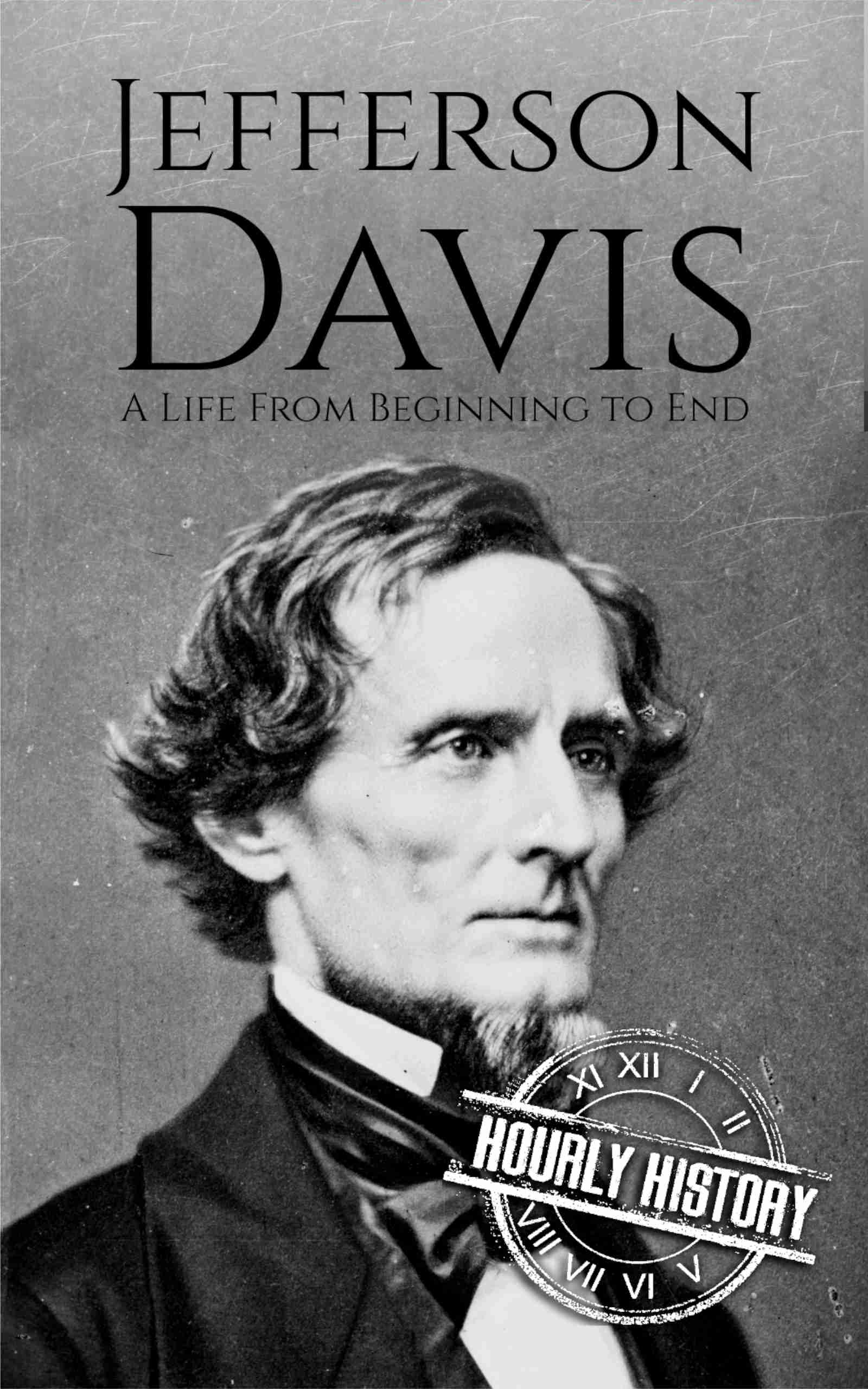Discover the remarkable life of Jefferson Davis...
Jefferson Davis—was he a rebel for a bad cause, or just a greatly misunderstood man? Davis was certainly lambasted as the ultimate evil during the American Civil War since he was the leading statesman of the Southern Confederacy. But what do we really know about Jefferson Davis? What motivated him and what made him tick? What inspired him to lead a cause that very nearly ripped the United States asunder?
Davis was a statesman and politician for sure, but he was also a soldier, a husband, and a father. In this book, we will explore the full character of Jefferson Davis from beginning to end.
Discover a plethora of topics such as
- The Eggnog Riot: A Rebel is Born
- The Black Hawk War
- Under Arrest
- Trial and Tragedy
- Fighting in the Mexican-American War
- The Rise and Fall of the Confederacy
- And much more!
So if you want a concise and informative book on Jefferson Davis, simply scroll up and click the "Available at amazon" button to avail this bargain!
Timeline
Jun 3, 1808
Born in Kentucky
Jefferson Finis Davis was born on June 3, 1808, in the town of Fairview in rural Kentucky to his parents, Jane and Samuel Emory Davis. He was the last of ten children; his oldest sibling, Joseph Emory Davis, was more like an uncle or second father to Jefferson growing up.
1811
Moved to Mississippi
When Jefferson was still a toddler, Jane and Samuel moved the family to the state of Louisiana before moving on to Mississippi, where they established what would be one of many cotton plantations.
1813
Started school
Schooling for Davis would begin with his attendance at the Wilkinson Academy in Woodville in 1813.
1816
Enrolment in Catholic school
After a few years at the Wilkinson Academy, Davis was sent to Kentucky, where he was enrolled at the Catholic school at St. Rose Priory. He was the only Protestant at the school.
1818
Jefferson College
Next, Davis took courses at Jefferson College in Mississippi in 1818.
1821
Transylvania University
Davis stayed on at Jefferson College until 1821 when he ventured back to Kentucky to take courses at Transylvania University.
1824
Davis at West Point
After his father died in June of 1824, Davis enrolled at the U.S. Military Academy of West Point. He spent a total of four years at West Point—years that were marked by mediocre grades and several demerits.
1826
The Eggnog Riot
At West Point, Davis was arrested for his participation in the so-called Eggnog Riot of 1826. One-third of the student body took part in this riot, which resulted in the court-martial of twenty cadets. Davis was eventually released from house arrest and allowed to return to his studies.
1828
Graduation from West Point
On July 1, 1828, Davis was given the rank of brevet second lieutenant in the infantry. He graduated from West Point 23rd in a class of 33 students.
1829
Davis’ first assignment
In 1829, Davis was ordered to join the First Infantry Regiment stationed at Fort Crawford in what was then part of Michigan Territory. Davis then moved on to Fort Winnebago, located around 180 miles to the north.
1831
At the frontier
In 1831, Davis was sent to watch over some mines in Dubuque, Iowa. Here miners, eager to get their hands on the riches that lay just past the frontiers, were getting into trouble with the Native Americans who lived in the area.
1832
The Black Hawk War
When the Black Hawk War broke out in the spring of 1832, Davis was on leave in Mississippi. After the war was over, he was assigned to escort the Sauk leader, Black Hawk, to prison. Black Hawk would never forget Davis’s kindness and consideration in his dealings with him, and he later wrote that Davis was “a good and brave young chief, with whose conduct I was much pleased.”
Feb 12, 1835
Davis on trial
In early 1835, Davis was charged with insubordination and was awaiting his trial to convene. On February 12, he was found guilty of conduct subversive of good order and military discipline, but the court found “no criminality to those actions.”
Jun 17, 1835
Marriage to Sarah Knox Taylor
In June 1835, Davis married Sarah Knox Taylor, the daughter of his commanding officer. Shortly after the wedding, Davis resigned from the army and joined his older brother Joseph in Mississippi. Joseph offered him a portion of his property as well as a number of slaves so that he could start a plantation of his own, which eventually became known as Brierfield Plantation.
Sep 15, 1835
The death of his wife
Sarah died from malaria only a few months after the wedding at the age of 21. Davis, who had contracted the same illness, almost joined his wife in death but ultimately pulled through.
1840
Entrance into politics
Davis entered politics in 1840 when the Democratic Party held a conference in Vicksburg. Here, he was selected as a delegate for Mississippi’s upcoming Democratic convention.
1844
Campaigning for Polk
The year of 1844 was an election year, and Davis was deeply entrenched in James K. Polk’s campaign from the very beginning. Meanwhile, he was courting an 18-year-old woman by the name of Varina Banks Howell.
1845
Marriage to Varina Banks Howell
Despite the significant age difference, Varina and Jefferson were wed on February 26, 1845. Later that year, Davis was elected to Congress for the United States House of Representatives.
1846
Davis and the Mississippi Rifles
After the outbreak of the Mexican-American War, Davis resigned his seat in the House of Representatives and raised a volunteer regiment known as the Mississippi Rifles. Under the command of General Zachary Taylor, Davis successfully took the Mexican fort of La Teneria in the fall.
1847
Wounded in battle
In February 1847, Davis fought in the Battle of Buena Vista, where he was shot in the foot. After his honorable service in the war, Davis was sworn in as a U.S. senator.
1853
Davis as secretary of war
After vigorous campaigning, Franklin Pierce became president in 1853. He duly selected one of his biggest supporters, Jefferson Davis, as his secretary of war. In this new position, Davis among other things succeeded in getting a pay raise for the U.S. troops for the first time in 25 years.
1857
Re-entrance to the Senate
When Pierce left the presidential office after one term, Davis was also forced to leave his post as secretary of war. He immediately re-entered the Senate.
1860
Lead-up to the Civil War
After abolitionist Abraham Lincoln was elected as president in 1860, the political climate in the U.S. unraveled quickly. South Carolina took the lead and left the Union on December 20.
Jan 21, 1861
Leaving Washington
When Davis’s home state of Mississippi left the Union in early 1861, Davis tendered his resignation from the Senate and left Washington.
Feb 9, 1861
Elected provisional president of the Confederacy
In February, Davis was promptly elected as the provisional president of the newly established Confederate States of America.
Apr 12, 1861
Start of the American Civil War
The American Civil War began in earnest on April 12, when the Confederates began bombarding Fort Sumter in South Carolina. Because the federal troops therein had refused to surrender the fort peacefully, Davis authorized the use of force.
Nov 6, 1861
President of the Confederate States
Davis was officially elected as the first (and only) president of the Confederacy in November of 1861. He was then inaugurated on February 22 the following year.
May 5, 1865
End of the Civil War
After suffering defeat in the American Civil War, Jefferson Davis renounced the Confederacy and his role as president on May 5, 1865. A few days later, he was captured by Union troops and placed under guard at Fortress Monroe in Virginia.
1867
Release from imprisonment
Although Davis faced serious charges, the deliberations dragged on and his case remained in legal limbo. Finally, after two years of imprisonment, he was released on bail.
1868
Pardoned by President Johnson
On Christmas Day 1868, U.S. President Andrew Johnson offered a pardon to those that took part in the civil war. Davis’s case was then officially dismissed in February the following year. Davis was yet again a free man.
1869
Leaving the plantation
Since Lincoln had issued the Emancipation Proclamation to free the American slaves, life on the plantation had been irrevocably changed. Instead, in 1869, Davis became the president of the Carolina Life Insurance Company in Tennessee.
1873
Semi-retirement
Davis stayed on with the insurance company until 1873 when he left in favor of a semi-retirement in which he wrote books and gave occasional speeches.
Dec 6, 1889
Death at age 81
Jefferson Davis died in December 1889, at age 81. At the time of his death, Davis was still a revered figure in the south, and the large crowd that came to his funeral stood as a testament to this fact.
Age of death: 81
Place of death: New Orleans
Cause of death: Acute bronchitis


